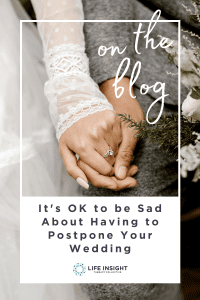It’s OK to Be Sad About Having to Postpone Your Wedding
Written by: Maddy Sims As Featured In: The Knot
The coronavirus pandemic has resulted in many wedding postponements. Couples counting down the days to their spring weddings are now planning to have their event later in the year or into 2021. If that’s the case for you (or for someone you know), our hearts go out to you. Planning a wedding takes time (the average engagement length is just over 15 months, according to The Knot 2019 Real Weddings Study) and couples have devoted their energy to planning everything from picking a wedding day outfit to coordinating all their vendors to finalizing a seating plan.
If you’re upset about not seeing your plans come to fruition on your actual wedding date, you’re certainly not alone. But navigating those feelings during these circumstances can be complicated. After all, there are people who are severely ill, schools that are closing down and business that are struggling. Therefore, is it a bad thing to be upset about postponing your wedding?
According to experts, the answer is no. “I like to say that two things can be true: there can be other things going on in the world and we can be sad about what’s happening in our lives as well,” says Sarah Kruse, master of science, licensed clinical professional counselor, and therapist at Life Insight. In fact, it’s healthy to acknowledge your feelings during this time—doing so will allow you to move past sadness and start building towards positivity. The Knot tapped Kruse and other therapists for advice on how to navigate your feelings of sadness during this uncertain time (plus tips on how to cheer yourself up).
What You and Your Partner Are Feeling Is Valid
First, Kruse says it’s important for couples to know that whatever they’re feeling—sadness, disappointment or frustration—is completely valid. “Feelings are a response to a situation, and we are allowed to feel whatever we’re feeling,” she says. “A wedding is one of life’s biggest events and something couples have been planning and looking forward to for a while, so a cancellation or postponement is going to bring some big feelings.”
You Can Feel Sad About Your Wedding and Feel Sad About Other Things Too
With all of the suffering and hardship other people are facing in light of the pandemic, you may feel guilty for being upset about your wedding. However, Jean Fitzpatrick, licensed psychoanalyst, a relationship therapist and premarital counselor in New York, tells The Knot that everyone is dealing with their own set of struggles—and those struggles deserve to be addressed. “Everybody’s anxious about coronavirus, so being upset about your wedding might seem selfish,” Fitzpatrick says. “But we all live on different levels at the same time. You can worry about coronavirus and feel sad about postponing your wedding.”
It’s Best to Face Your Feelings Head-On
So, what do you do? The best way to handle the situation is to address your feelings. “Feelings don’t just vanish,” Fitzpatrick says. “I tell people feelings are like a heavy backpack: even if you refuse to open it, you’re still carrying it around.” Fitzpatrick adds that there can be consequences to holding all of your feelings in. “If you don’t let yourself grieve, the sadness and frustration will come out in other ways, like irritability or even mild depression.”
Once you fully acknowledge your feelings, you will be able to work through them and eventually create positivity in your life, adds Rachel Sussman, licensed clinical social worker, therapist and relationship expert. “This too shall pass and you will get married at a future date,” she says.
Now Is the Time to Keep Sharing With Your Partner—and Engage in Active Listening
Fitzpatrick says that not everyone will understand what you’re grappling with right now, so carefully choose who you want to share your feelings with. However, she, Kruse and Sussman all say it’s important to lean on your partner during this time. Share what you’re thinking with them, but also be there for them.
You’re two different people, so it’s likely you both might react differently to the situation. “Chances are there are different aspects of the situation—big and small—that are upsetting to each of you.” To ensure both of you feel heard, Fitzpatrick suggests taking turns talking about your feelings. Avoid judging or dismissing anything your partner says. Just as you want to be heard and validated, so do they.
If your partner is feeling especially down about the situation, Fitzpatrick says the best thing you can do is simply be there for them. “When you’re feeling helpless about their sadness, remember that your presence and willingness to listen will make all the difference,” she says. “You can’t fix this totally, but just being there for them means so much.”
Seeing as your emotional reactions might be different, your coping methods may differ too. You might prefer talking out the situation nonstop while your partner silently compartmentalizes. Fitzpatrick suggests scheduling specific times of the day to talk about your feelings and specific times devoted to other activities.
If You Need a Break From Planning, Take One
On that note, it’s a good idea to take a break from wedding planning stress if you can. It can be challenging to do other activities when you’re staying inside, but Fitzpatrick recommends planning different ways to pamper yourselves. Go for a leisurely stroll to stretch out your legs, or turn off the news and listen to your favorite music together. Give each other a soothing massage—or spend time in the kitchen cooking together.
Sussman adds that you can use this time to have fun with each other. “Have at-home exercise competitions, play board games, plan movie nights, organize a cook-off,” she says. “Acknowledge the sadness but also use the time to truly bond as a couple.”
If you’re too focused on your wedding, Fitzpatrick also suggests reaching out to others. “Check to see whether a family member or neighbor needs groceries or just a quick daily phone chat.”
Remember: You Can Still Celebrate Your Love
A wedding is such an incredible way to celebrate your love for one another. But if you have to postpone the date of the celebration, Kruse recommends finding another way to make the original wedding date special. Whether you spend a day devouring your favorite foods, enjoying a movie marathon, or cooking a fancy dinner together, there are still ways to enjoy this time. Slow dance in your kitchen or write love notes to each other.
If you’re separated from each other during this time, make an effort to call each other often, send letters in the mail to each other, or deliver special gifts to their doorstep. If possible, throw yourselves a virtual date: learn a new dance together or cook the same recipe at the same time.
At the end of the day, Kruse says that the most important thing is your love. “Look hard for the blessings in the situation and practice gratitude,” Kruse says. “It’s a disappointment, but the big picture is a marriage and building a life together—and those things will still happen.”
Try to focus on how amazing the wedding will be when the date arrives. Or, if you want to get married, plan an elopement! Make it official at the courthouse, inside of your home, or at your favorite outdoors location.
Take This as an Opportunity to Grow Together
While your wedding may be postponed, you will still have one down the line. In the meantime, you have each other to get through this time. Kruse says that going through this kind of situation can help couples grow closer and stronger. “How a couple weathers this storm is a good indicator of how they’ll weather future storms,” she says. “If there’s work to be done together, this is the perfect time to do so.”
Couples who are unsure of how to navigate this tricky situation can download Lasting, the first of it’s kind marriage app. It offers guided marriage counseling that you can do together in the comfort of your own home.
Fitzpatrick adds that enduring tough times will help you learn more about each other, ultimately making you a stronger team. “Sooner or later, every married couple faces challenges,” she says. “That’s why the traditional marriage wedding vows include, ‘for better or for worse.’ What will make your marriage solid and lasting is not the absence of pain or disappointment, but your ability to be a team and support each other through tough times.”

Join Our Community.
Sign up for our quarterly newsletter with practice news, timely resources, staff highlights, and other helpful tidbits!
Recent Posts






